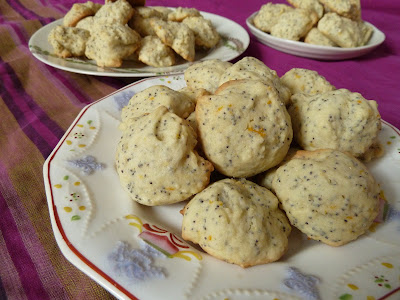Mohn (Poppy Seed) Cookies

Several months ago, by pure chance, I stumbled upon a wonderful little shop in New York's West Village. Bonnie Slotnick Cookbooks, in the ground floor of an old brownstone on West 10th Street, specializes in out-of-print cookbooks, as well as some vintage kitchen gadgets, linens, and antique and handmade cards. Bonnie is kind, knowledgeable, and has experience as a cookbook writer and editor. If she doesn't have a book in stock, she'll try to locate it for you: Bonnie found me a first edition of Claudia Roden's A Book of Middle Eastern Food, just like my mom's, and she has a collection of rare items in her shop, such as vintage cooking pamphlets and housekeeping manuals from early part of the 20th century.
I went in to see Bonnie the other day and she very generously shared her grandmother's Mohn Cookie recipe. Mohn means "poppy seed" in Yiddish, and poppy seeds figure heavily in Jewish cooking, most famously as a filling for the cookies called hamentashen that are eaten during the holiday of Purim, which starts at sunset tomorrow night, March 19th. An interesting component of this particular recipe is the addition of a large amount of orange zest. According to Bonnie, many of her family recipes are flavored with citrus. Why citrus figured so prominently in her ancestors' cooking is unclear; it was very hard to come by in the Eastern European communities from which they emigrated in the 19th and early 20th centuries. One can only assume lingering influences from earlier Jewish culinary traditions.
What I've learned about myself and my cooking over this last year of blogging is that the food itself is only half the joy. I seek out recipes that tell a story, have a history, and are interwoven with love and the comforts of home. I look forward to discovering more family recipes from many cultures over the coming months!
bonnieslotnickbooks@earthlink.net

Mohn Cookie Recipe Card from Bonnie's Family Archives
Light textured and not overly sweet, these cookies are delicious with coffee or tea, ice cream, or fruit (especially oranges). They’re super-easy and quick— you can mix and bake five dozen cookies in about half an hour (and you can eat them all in about half that time).
For about five dozen small cookies, you will need:
- 3 cups all-purpose flour
- 3 to 4 tablespoons poppy seeds
- 1 tablespoon baking powder
- 3 large eggs
- 1 cup sugar
- 1 cup vegetable oil
- 1 teaspoon vanilla extract
- Grated zest of 1 orange or a few drops pure orange extract
Directions:
Preheat the oven to 350°. Lightly oil two or more baking sheets. Parchment paper also works well. In a medium bowl, stir together the flour, poppy seeds and baking powder; set aside.
In a large bowl, beat the eggs and sugar until thick and light-colored. Gradually beat in the oil. Add the vanilla and orange zest or extract, and beat until blended. Add the flour mixture and stir until well blended; the dough will be thick.
Drop the dough by teaspoonsful on the prepared baking sheets, leaving about 2 inches between the cookies. You may be tempted to make perfectly round cookies, say using a miniature metal ice cream scoop, but I find the cookies are more rustically pretty if you simply use a teaspoon and your finger.
Bake for 4 minutes, then turn the pans in the oven and bake for 4 minutes longer, or until the cookies are light golden at the bottom edges (and barely golden on top). Note: Depending on your oven, you may need to bake them an extra two minutes or so after turning the pans, especially with the first batch when the pans are cool. Once you start reusing the hot pans for subsequent batches, you may be able to reduce the cooking time a touch.
Using a metal spatula, transfer the cookies to a rack to cool.
Makes 4 to 5 dozen, depending on size
Bonnie's Notes:
• If the cookies brown too much on the bottom, try doubling the baking sheet to insulate them from the bottom heat. I use double-bottom (Cushionaire) baking sheets.
• Depending on the brand of flour, the size of the eggs, and the freshness of the baking powder, these cookies may come out flat, rounded, or with peaked tops. Who cares—they still taste great! You can make them very tiny (less than a teaspoon of dough) or medium size (heaping teaspoons) but not much larger because of their delicate texture.
• If you happen to be out of oil (or don’t have enough) you can substitute melted butter for all or part of the oil. You may even like the cookies better that way.
• The recipe divides nicely by 3. It can also be doubled.
• The cookies pack well if placed in pairs, flat sides together, in plastic bags. They also freeze beautifully.
• Variations: Use lemon zest instead of orange, or mini chocolate chips or finely chopped crystallized ginger instead of poppy seeds.